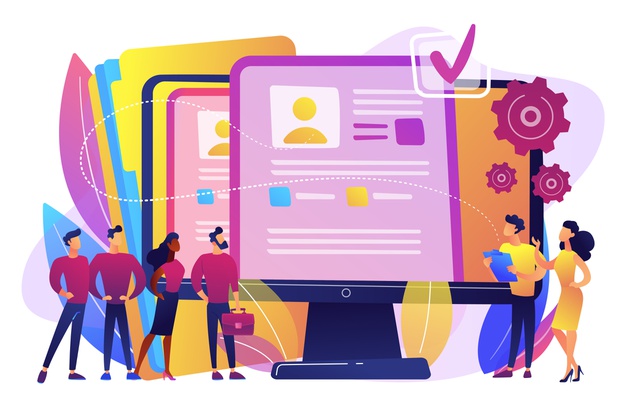Send Us a Message
Contact Information
Skizzle Technolabs India Pvt. Ltd.
Noel Focus, Kakkanad,
Kerala, India – 682021
When looking for the right software for your HR operations, you might struggle to differentiate the various types available. From HRIS, HRMS, and HCM, it is so easy to mix up all these letters together and mismatch their corresponding benefits. Hence, you need to equip yourself with the right knowledge to make sure that you choose the one that can accommodate your needs.

Nowadays, technology plays a critical role in HR if you want your business to remain competitive and relevant in the market. In fact, a survey by PwC in 2020 shows that 74% of companies plan to increase their spending on HR technology to accommodate their needs in managing talents and the workforce. It is high time you explore what these types of technology have to offer for your HR.
With that, here is a comparison for HRIS vs HRMS vs HCM and their corresponding benefits to help you decide which one suits your business needs.
HRIS stands for Human Resource Information System. It is software that helps you manage your people, procedures, and policies within the company. It also allows you to track and automate core HR processes such as recruitment, payroll, compliance, and training. It can also serve as your database for all HR files, documentations, and employee data. You can also use it to leverage data and analytics and generate reports.
Every software in the HRIS systems list has its own set of functions and features. But at its core, it provides you with tools to operate your HR processes digitally. This includes:
In short, HRIS serves as both a core platform for your HR operations and an information system containing all critical HR data within the company.
At first glance, HRMS and HRIS are almost the same. After all, Human Resource Management System or HRMS covers all the elements included in an HRIS system. The main HRMS and HRIS differences are that the former delves deeper into talent management just like HCM. Thus, if you are looking for an all-around HR platform, HRMS might be the one for you.
HRMS covers a wide range of capabilities and features for businesses of all sizes. However, every software is unique. There are those that might look more like an HRIS, while others might be built more like an HCM. Nonetheless, the two main characteristics of an HRMS are payroll, and time and labor management.
Finally, you have Human Capital Management or HCM. As mentioned earlier, HCM focuses on talent management. It is meant to handle the entire life cycle of your employees—from recruitment, management, development, engagement, and retention. Unlike the first two types, HCM doesn’t stick to the core HR needs for small and mid-sized businesses. It looks into the global HR capabilities of large enterprises.
HCM basically has the same capabilities as that of HRIS. It also handles:
But more than that, HCM focuses on the scalability and global reach of your HR processes. Hence, more businesses are recognizing the benefits of a cloud-based HCM that allows their HR processes to grow along with the company.
On the surface, these three types of HRIS systems offer the same benefits to your business. After all, they all share the same goal which is to help you manage your employees. They do this by:
All these software solutions can help you digitize and streamline your HR processes. They all incorporate cloud computing, databases, and other elements to create comprehensive solutions for your HR needs. Moreover, these are the perfect tools to allow your HR to work remotely.
The lines that separate one type to the other tend to get blurry. This makes it harder to determine which type really is for your company. Nonetheless, it is unfair to say that one is better than the others. All of them have their own advantages and disadvantages. In the end, it will all boil down to what your business needs.
Start by asking yourself: How many employees do I currently have? How many resources can I spare for the software? What are the tools that I am currently using? What are the issues that my company is facing regarding HR? How can these be resolved?
Answering these questions can help you narrow down what specific features you need for your HR solution. You can also check out these HR management software examples to find out which ones will fit your business.
More businesses are striving towards digital transformation. Using HR technology is no longer a luxury but a necessity. Its benefits are crucial in ensuring that your business can catch up to its competitors in the market.
Choosing the right HR software requires proper knowledge of the different types available. So go ahead and explore what each has to offer for your business. Find out which one will work best for you.

High-performing teams are the distinctive feature of an industry-leading business. This can ensure the business's success in the long run. Working in a team...
Read More
Since the pandemic hit the world, the new normal is working from home. Gen Y and Gen Z are the largest workforce units of...
Read More
You have much to consider when looking for a solution for human resources (HR) technology. What is the right fit for you? How are...
Read More
As we have seen human resources and information technology have become more intertwined during the last decade. Manufacturing, financials, sales and marketing, and supply...
Read MoreSkizzle Technolabs India Pvt. Ltd.
Noel Focus, Kakkanad,
Kerala, India – 682021